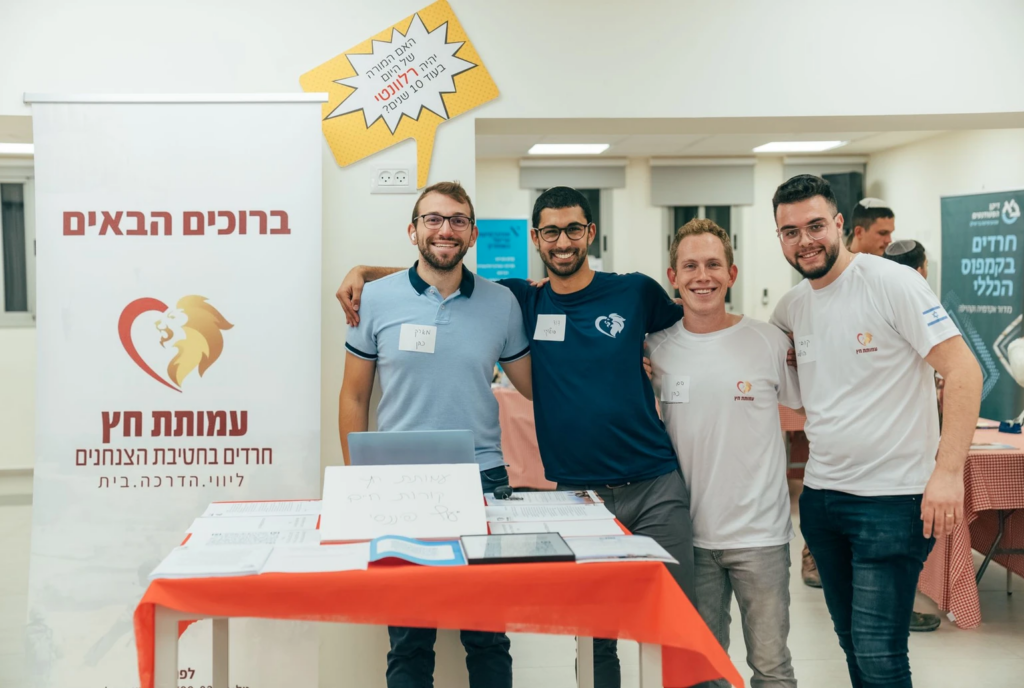Chetz l’Atid – Arrow Towards the Future
When released from duty, soldiers in the Ultra-Orthodox unit Chetz face problems their peers do not. Coming from the Ultra-Orthodox sector, Chetz veterans often have little social support, lack crucial life skills, and struggle to build successful careers. Chetz l’Atid aims to help Chetz veterans acclimatize to society through mentorship, workshops, academic preparation, and career guidance.
Project summary
Status:
Students:
David Salooki, BA; Shai Adler, BA
Mentorship:
Uriel Reich, Human Resources
Impact Fund investment:
NIS 150,000
Ripple effect:
45-60 Chetz Ultra-Orthodox Paratrooper Soldiers join the program to facilitate their impact in and on Israeli society and the world at large

Student entrepreneur
Shai Adler and David Solooki are the co-founders of Amutat Chetz, the Association of Ultra-Orthodox Paratrooper Soldiers. Shai and David both made Aliyah from the US in 2014 and attended Yeshivat Torat Shraga. During their military service, Shai served as a commander and officer in Chetz, and David served as a commander in Maglan, a special forces unit in the IDF’s Commando Brigade. Shai and David are both currently students at Bar-Ilan University studying Technology Management and Electrical Engineering, respectively.
End of year summary
Due to the war that started on October 7th 2023, like many people and organizations, our plans had to change as most of our volunteers and leadership team were called up to reserves or were not released from their military service at all. Despite this, we still accomplished our goals of 1) helping prepare soldiers for life after the army 2) providing care and support for soldiers in need, and 3) empowering and engaging our alumni. Despite the challenges, we were still able to implement successful programming for two cohorts of graduating soldiers, including seminars, civilian tours, vocational testing, and more.
Seminar
- The two-day seminar held at the Ramada Hotel in Netanya served as a vital preparatory phase for our soldiers, equipping them with valuable insights and knowledge to navigate the challenges and opportunities awaiting them beyond their military service. The seminar featured a diverse array of lectures from various fields and topics.
- Elan Cohen’s lecture on “Body Language and Non-Verbal Communication” offered crucial guidance on conducting oneself effectively in interviews and professional settings. Rav Chanoch Rogozinsky shed light on “Rights and Obligations in the Job Market,” providing information for the transition into civilian employment. Kobe Hols’s presentation on “University Studies and Scholarships” addressed academic pursuits, while Yahav and Noam Spinrad’s “Captain Invest” lecture delved into financial literacy and investment strategies.
- Soldiers also had the opportunity to explore personal development with coaching for achieving specific goals.
- Finally, Guy Alfrenadi’s and Daniel Dayan’s talk on “Finding Yourself After the Army” encouraged soldiers to embark on a journey of self-discovery as they transition into civilian life.
Civilian tours
- We organized visits to Bar-Ilan University and NVIDIA, allowing our soldiers to witness firsthand what it’s like to engage in higher education and immerse themselves in the vibrant Israeli high-tech scene.
- These excursions offer a unique opportunity to explore academic environments, interact with students and professors, and gain insights into cutting-edge technologies. By exposing our soldiers to these institutions, we aim to ignite their passion for learning and innovation, inspiring them to pursue higher education and embark on successful careers. These experiences not only enrich their academic knowledge, but also empower them with the vision and ambition to make a significant impact in their chosen fields.
Vocational testing:
- The Feuerstein Institute’s Learning Propensity Assessment Device (LPAD) is a dynamic cognitive assessment comprising 14 diverse tasks that focus on how an individual thinks and learns. It employs a test-mediate-retest model, emphasizing learning throughout the process to gauge cognitive functions.
- Unlike static assessments like IQ tests, the LPAD prioritizes understanding an individual’s learning process and potential, rather than comparing their knowledge to peers.
- This test allows our soldiers to better understand their skillset, strengths, and career prospects. Following the LPAD assessment, our soldiers have the opportunity to meet with a psychologist. Additionally, any soldier can choose to engage in further follow-up sessions for continued support and guidance through the Feuerstein Institute.
Power the future.
To honor the birthday of Jane Stern Lebell, please consider contributing to The Jane Stern Lebell Community Impact Fund.

Thank you for partnering with us, shaping tomorrow by creating impact today!
American Friends of Bar-Ilan University
160 East 56th Street, Floor 5
New York, NY 10022
